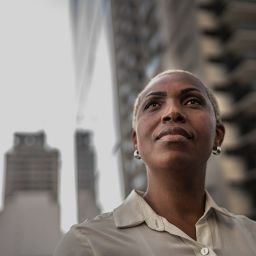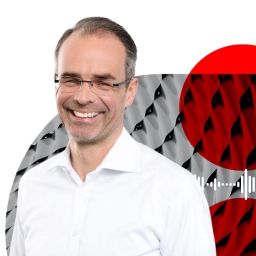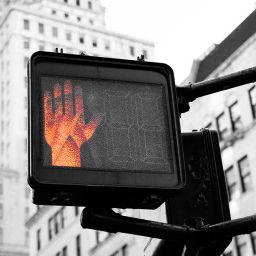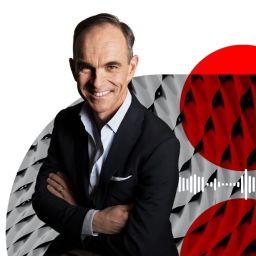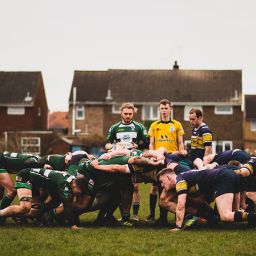We all talk about bringing our whole selves to work and workplaces that allow you to be authentically you. But should you? Really? And do they? Really?
Let’s ask a leader who could never be less than her whole self. And an expert on people management…
Ibukun Awosika (IESE GEMBA & GCP) is an entrepreneur, leader, speaker and challenger. Former chair of the First Bank of Nigeria. One of the original dragons on the African version of Dragon’s Den. Author of several books, including The Girl Entrepreneur. And Forbes Chairperson of the Year award winner in 2020. Professor Marta Elvira is Professor of Strategic Management and Managing People in Organisations at IESE Business School, one of the world’s best business schools – ranked No.1 in the world for six years running by the Financial Times.
This is Real leadership podcast: Every episode, a business leader shares human stories and hard truths from their career. And an expert turns those stories into lessons we can all learn.
In this episode, Ibukun and Marta discuss:
- Can we expect business to be better than society?
- How to be more you
- Authentic and aligned: when bringing your whole self to work really works
- What is authentic leadership?
Listen to this podcast:
Listen & subscribe on:
Spotify Apple podcasts Amazon podcasts
Fore more content like this visit the Real Leadership website.
Podcast transcription:
Adam:
Hello and welcome to This is Real Leadership. Where, every episode, a proven business leader shares human stories and hard truths from across their career. And an expert turns those words into lessons we can all learn.
And, in this episode, those lessons are about the modern idea of authenticity. Best summarized, I think, in the phrase: bringing your whole self to work.
I’m Adam Burns. I have been talking and writing about business leadership – good and bad – for over 25 years, and still, every day’s a school day. Which is why, in this podcast, I’m also joined by a distinguished professor from IESE, one of the world’s best business schools – ranked number 1 in the world for six years running.
They’ll also be talking with our guest. And then, just with me. Offering their expert analysis of the conversation as I ask: what are the real leadership lessons here? What can we learn, in around 30 minutes, that can have a positive impact on us and the people around us, the places we work and the world in which we live?
Let’s find out. Welcome Professor Marta Elvira…
Marta:
Thank you very much for having me here, Adam. It’s a pleasure.
Adam:
The pleasure is all mine. Thank you for joining. Now, Marta, you’re the professor of strategic management and managing people in organizations at IESE Business School. Typically, do people find it difficult to be themselves in business, or do businesses make it difficult for people to be themselves?
Marta:
The easy answer, in social science, is that it depends, right? It depends on the person, and on the organization. If you look at someone like Ibukun, she would feel comfortable being herself anywhere. Other people, those who, perhaps, are less successful, have less influence, or less clarity of identity, might not feel as comfortable, initially, depending on the context.
Adam:
Well, that’s a great starting point. Being yourself at work often depends on the person and/or the organization. But not for our guest today, who would feel comfortable being herself anywhere. Is that comfort, then, because of her success, or is her success because of that comfort?
Because Ibukun Awosika is certainly successful. Among her many titles and accolades: former chair of the First Bank of Nigeria, a non-executive director for Cadbury PLC, one of the original dragons on the African version of Dragon’s Den, author of several books, including The Girl Entrepreneur, fellow of the African Leadership Initiative and Aspen Global Leadership Network, and Forbes Chairperson of the Year award winner in 2020.
Marta has spoken with Ibukun before, and was hugely impressed with her authenticity. And we will talk about that later. But first, back to that phrase: bringing your whole self to work. Society finds it difficult to accept everyone. We asked Ibukun, “Is it unfair, therefore, to expect businesses to be better?”
—
Ibukun:
It’s a tough situation, because a business is a subset of the society within which it operates. The individuals within the business are from the same society as the one in which it operates. If it’s a challenge for the entire society, as a whole, to be all of those things, how easy can it be for a product of the society, or a subset of it, to be better than that society in all the ways that we expect? Now, you can look at it the other way as well, and look at the challenge of responsibility. Because, once you put yourself out there as a leader, building an organization within a society, you’re offering certain promises to the society. The challenge is, can you easily get away from who you are as a member of the society? Because your mindset, your thinking, your attitude, your thought process, has been shaped by that same society, no matter how great you are. We can continue to attempt to be better than the society, and to be the model for the society, because of the sense of responsibility that we have as a business. However, it’s a process. It’s a permanent work in progress.
Adam:
Marta, Ibukun reminds me of that saying, “You can never step into the same river twice,” you know? About how business is forever changing. Where do you stand on this, Marta? Do you think that it is unfair to hold businesses to a higher standard than society as a whole? Or do you think that, actually, that is what leadership is about?
Marta:
I like the comparison of the river, because the river flows and is never the same. As Ibukun was mentioning, organizations learn. And we can all agree, looking back, say 20 years, when I think most of us were already working, that organizations look very different now, relative to a few years ago. So, organizations learn. What is important, I think, from the viewpoint of leadership, is that organizations are made up of persons. I’m not going to say people, intentionally. Because I think we could potentially hold organizations to a high standard in relation to that level of moral responsibility Ibukun was mentioning, in the sense that, the dignity of each of the persons in the organization is what matters to us. Most organizations have a mission; that purpose, or that sense of contributing to society through their business activity. A way of contributing to society that starts by considering individuals within the organization. So, I think there is a high level of responsibility. At the same time, we cannot avoid, and we will reflect, the society in which we develop.
—
So, one aspect of leadership, for Ibukun, is attempting to be better; to model a better society. Even if this is forever a work in progress.
The next part of our conversation is about how Ibukun models the organizations she leads. How does she attract the like-minded? But, we start at the source. How does Ibukun choose to model herself?
—
Ibukun:
You must get to a place of self-actualization and self-understanding that allows you to define what is important to you, and what you’re willing to fight for. And, once you get to that place, which is how I walked my journey, you then feel that you owe it to yourself, more than to anybody else, to make sure that the things you consider important and valuable are the things that you set out to do. Luckily, for me, I made those choices at a very early age. And then I walked that, without wavering, in many ways, shaping the society around me to accept my ways as my ways. And, over time, others became attracted to that independence of mind and values.
Marta:
I’m wondering…because it isn’t easy to attract people with a similar set of values, and to get them to work with that same sense of strong purpose. So, is there any way you would suggest for organizations to identify, select, and further develop people to create that sense of shared responsibility?
Ibukun:
I think that happens naturally, over time. I would say there are two things to consider when hiring someone. I would consider their skills, but I would also consider their character and their values. And therefore, if you, as an organization, consider that to be important, then your selection process for hiring would have some markers within it, as a minimum, to help you sort out some of those things when looking at the options you have. Now, you are going to end up with some people who come in and, somewhere along the line, you find out that they don’t really fit in. But, because you have a sense of the kind of organization you’re trying to build, and what is acceptable within it, you would be quick to exit them when you can. There are also some people who will come in almost neutral, or who will come in a certain way, and who will be influenced by the examples within the organization. And you will, sort of, mold them and change their worldview, in a sense, so that they get better in the areas that are important to you. So, an organization is, in itself, an animal of influence, in many ways. It can shape and mold the people that work within it.
Marta:
So, this reminds me – a lot has been made of “bringing your whole self to work”. And we teach it in business schools. We sometimes want people to bring their whole energy, mind, and engagement to work. To the extent that, in some organizations, it can become so encompassing that, when organizations don’t reciprocate, for example, in the case of recent layoffs, where many workers, especially in those in tech, identified so strongly with their organization’s purpose of development, etc., it is a shock to find out that the organization can dispose of them when they are no longer needed. And maybe the identification with work had become excessively encompassing. Is that a danger, or do you not find that?
Ibukun:
Well, to be honest, I think it’s very naive of anyone who works within an organization to not understand that, at the end of the day, as much as the organization would look out for your interests, ultimately the responsibility of leadership within an organization is to look out for the interests of the organization. You cannot say that because an organization has embraced these people, or because people are encouraged to embrace the organization so aggressively, that it should then lose the power to make what is a survival decision for the organization. For me, it would then be about how you do it. Because there’s a right way to do it that still maintains the relationship, and the values that you speak about. And there’s a way to do it that’s just a capitalistic move, without consideration for the human being at the heart of it. So, that is a function of the particular style of leadership, and the type of institution. Because if you are considerate towards your people, even when you get to that point, you’re not going to do a cut-and-paste elimination of people. You’re going to have conversations; you’re going to allow people to understand the issues at play, how you got there, and why you’re making those decisions. And you would address, or try to redress, the people as much as is possible, in order to give them a soft landing with whatever challenges removing them will incur.
Marta:
And this brings me back to the initial conversation that we had, and how you were very clear, from the beginning of your career, about what your lampposts were, what your guidelines and values were. What would you suggest for organizations that need constant renewal, both of their business and also their talent, and their creativity? How can they combine that clarity in their DNA with constant growth and development? You’ve also worked across many cultures, and I wonder how you’ve managed to remain so true to yourself while constantly growing.
Ibukun:
I think communication is a majorly powerful tool. Communication, and example setting. Because, you know, words are cheap. Anybody can say anything. But action is tougher. And if you communicate very clearly what those expectations are, if you communicate very clearly what your vision is, if you communicate very clearly what your values are, and you document this as much as is possible, but more than that, you build those things that you say that you are into the DNA of the practices and the processes within the organization… Because, the leader, or the founder, will not be the one that is seen every day. But, if you’ve built it as a culture, and as the DNA, and the leaders you choose along the pipeline, to a large extent, represent the culture… That’s how corporate cultures are built, in a sense. There is good culture, bad culture. But how do you maintain it? It’s in continuous renewal, never taken for granted. Being consistently deliberate in choosing leaders at every level, not just leaders at the top, who represent what you consider to be important within your organization. I think, this way, over time, you would find that you’re able to consistently move the values forward through the generations.
Adam:
Ibukun, could I just take you back to your answer to the previous question? Which is that, at the end of the day, if the leadership has to make some tough decisions, and we’re talking about people bringing their authentic selves to work etc., how much harder is it if it is a family run business? If you are working with family, as opposed to just a standard organization?
Ibukun:
I think, with families, it’s usually a little more difficult. Why? Because family businesses, by nature, are very emotional organizations. The people who work there tend to be adopted as members of the family, especially those that have worked there for a long time. Therefore, their process of decision making, in some ways, can be compromised by the emotional attachments that are built within the environment of the family business. In traditional organizations, like you said, things can be a bit more cut-and-paste, because there’s a bit of distancing, emotionally. People are related in terms of their roles, but not necessarily in their interactions. So, I think it’s more difficult with family businesses, or smaller businesses. And, it’s probably more process driven in larger organizations, and a little more detached.
—
Adam:
And now we know: being more authentic at work requires self-awareness as much as self-confidence. Only when you know your principles, and the things you want to stand for, can you find an organization that aligns with them. Or find like-minded leaders to build an organization with.
And we’ve certainly talked about how to build those organizations.
But perhaps what’s still missing is what makes Ibukun, Ibukun? What is her authentic self? Marta wanted to find out…
—
Marta:
One of the things that has always struck me about your work is your sense of responsibility toward society, which we can also understand as country. When you have traveled and done business all over the world, you have always stressed that sense of giving back to the society where your business was set up. And, also, giving back to younger generations. Like with the book Girl Entrepreneur. You’ve mentored a lot. You’ve made a lot of contributions, in a less direct manner than just directly through the business. I was wondering if you can speak to that sense of responsibility.
Ibukun:
Well, I firmly believe that, frankly, you can’t work alone if your society, your environment, and your community isn’t working. Imagine: you’re the one single rich guy in the middle of everybody else suffering, and you have a massive house. In fact, there’s a saying in my tribe, in my country, that one rich man in the middle of a thousand poor people is a poor man. Why do they say that? It’s basically that, if you stand alone, succeeding, and other people aren’t, everybody is going to come to you for help. And when they do, you’re going to have to spread what you think is just for you and your family to a thousand other people. Which will average out to making you poor, at the end of the day. So, you’re better off investing in building the lives of the people in your community. And when you do, and there are many more people, you have a better community. You’re safer. Basically, I want a better society. That’s something I hold extremely dear. I think that doing good should not be separate from doing well. And doing well should automatically make you able to do good, and it should actually give you joy to do good. But to do good strategically. You know, I don’t like charity. Just doling out. I like strategic good that helps other people to maintain their dignity and become better. And to build a better society overall, because you’re building better people within it. And so, what I always do is, I don’t mind starting alone, and I don’t mind starting small, but once I have proof of concept, and I begin to push on it, I’m certain that others will see what I see and join me. And that’s what’s always happened. So, I’ve learned over time that, if I believe in something, I should just go with it. I just need to find one or two people to work with. And I keep moving. And then, somewhere along the line, other people come. So, it’s the bigger goals that drive my smaller actions, and there’s nothing more satisfying than seeing real results in the lives of people. It makes me happy. It sets me free. It’s become part of my identity. For me, it’s a real joy. And I think that’s all… You know, all these corporate organizations we build, or these positions we occupy, if they don’t impact the lives of others, they’re useless. You know? I don’t want to have billions of whatever currency in a bank account, doing nothing. Really, it’s useless. I always say, the real value of money is what you get to do with it. And it’s the same with position and power. What are you doing with it that will cause change, or impact lives for good? Then, it becomes valuable. Because the day you die, you’re going to die and be buried in a six-foot box. Nobody gets buried with their money, or with their power or position. That will go. Position will go, power will go. And we’ve seen enough examples of that. So, it’s about making every minute count, in terms of value, and impacting the lives of others. That’s how I count my own currency. My currency is in impact. My currency is in lives. That, I prefer.
—
Adam:
Thank you to the brilliant Ibukun Awosika. Now, Professor Marta Elvira; time for your analysis. Ibukun talked about building businesses that are a model of better societies. Of self-awareness and principles. We promised real business lessons. What did you learn?
Marta:
Well, I think we can all agree that it’s difficult to summarize such an inspiring and wide-ranging conversation. But if I had to select three highlights, I would say, firstly, the clarity of values and the DNA at both the organizational and the individual leader level. This relies, for her, on having a very clear understanding of the dignity of each individual, and of yourself. I really like the way she said that bigger values guide the actions. And that she doesn’t mind working alone, or working small, because she has very good clarity of objectives and values. It will grow. But it doesn’t matter if a startup or an entrepreneurial initiative is small, as long as it starts growing with the right mission and purpose. Secondly, I think that, for leaders, this transformational impact is important; doing strategic good. In the case she described for us, this meant investing in the community in order to make yourself better, and to make everybody better. To me, that was a combination of doing good for everyone, for the leader and for the community, which was very clearly illustrated with the experience of Ibukun. And I think the third aspect is that, having clarity in the DNA doesn’t mean a lack of adaptation to the context. One of the examples that I remember from my own research in Latin America was visiting a large German factory in Mexico, in the Maquila, where they had the latest machinery, and, being in a central European company, a display of our Lady of Guadalupe. We interviewed the general manager of the plant, and he said, “Well, we work with state of the art machinery, but under the watchful eye of our Lady of Guadalupe”. This is Mexico. And so, to me, that was a lesson in learning to adapt, right? You may be able to adapt the kind of symbolism you display without losing any of the DNA or the values of the organization.
Adam:
And one thing in particular I’d like your opinion on: Ibukun said that in traditional companies you’re related by job title. In family-run companies, of course, it’s by blood. But, so often, we hear that language from traditional companies: we are a family. Maybe they’re trying to get the best of both worlds: the commitment of a family, the pragmatism of colleagues? But that is a fine line…
Marta:
Exactly. It’s a fine line, like you mentioned. It requires a lot of reflection, rather than a formulaic list of best practices which do not consider the fact that organizations are made up of individual persons. Again, I’m not talking about people. So, we may have a common set of values and a mission for the purpose of this organization, but that doesn’t mean you need to identify your whole self with this, external to your self-organization. And I think Ibukun made it very clear, in the sense that, our impact is not only realized through that work, but in the service of society, of family, and of another, bigger set of values. So, keeping the individual and the organizational identities within their boundaries might be difficult, but it’s achievable. There are two aspects to this. For family businesses, we always recommend setting clear governance for both the family and the business, as separate entities that intersect. Because the identifying aspect or dimension of a family business is that legacy intention. So, in many ways, you cannot separate the objectives of the company from the legacy to your family members, or through a foundation like it occurs in many other places. The reverse may be true for very impersonal corporations, where people are sometimes considered to be a number rather than an individual. In that case, we may need to consider the fact that people have their own external environment which also impacts the way they work. Right now, I’m thinking of a very, very large engineering company, a corporation, that started as a family business but is no longer that. It’s over a hundred thousand people. And recently, in an effort to develop this more clearly and reach out to their employees, they actually interviewed a large number of their family members, as a representative sample of their entire workforce. They interviewed their family members in order to know how the family members’ perceived work was having an effect, in order to improve consideration of the fact that employees have an external aspect to their work.
Adam:
Marta, thank you very much.
Marta:
Thank you very much to you, too.
Adam
Thank you Professor Marta Elvira, Professor of Strategic Management and Managing People in Organizations at IESE Business School. And thank you, of course, for listening. Please do subscribe, share and let us know what you think of our podcast. If we want people to be more authentically themselves at work, should we build more companies like families? Or is it the exact opposite – because who can really be their whole selves in front of their parents? Do you think differently to Ibukun and Marta? You can let us know by email, and please do. All details are in the podcast description. But, for now, from me, goodbye.








